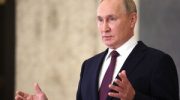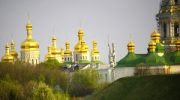Moscow has mistakenly decided that Russian-speaking or the Orthodox faith makes some Ukrainians somehow “pro-Russian.”

The proposal to betray Ukraine was received by Oleksandr Vilkul on the second day Russian invasion . The “former colleague” called the politician when the Russian troops were advancing to Kryvyi Rih.
“He said: Alexander Yurievich, look at the map, you see, the situation is already determined. Sign an agreement on friendship, cooperation and defense with Russia. And you will have a good relationship with them. You will become an influential person in the new Ukraine, “he recalled a conversation with one of the former ministers of the pro-Russian regime, Viktor Yanukovych.
According to him, the gray zone in Ukrainian politics has completely evaporated. Missile strikes on Kryvyi Rih convinced him that the only option available was to resist.
If the first months of the war against Ukraine were a complete disaster for the Russian army, the Russian invasion in general revealed another major failure: Moscow misjudged the political space of the country it was attacking. This miscalculation cost the lives of Russian soldiers no less than the ill-conceived tactics of tankers whose combat vehicles were stuck in the swamps.
Read also: Russia intends to declare a full-fledged war on May 9 – Shmygal
The Kremlin went to war with the expectation of a quick and painless victory, expecting Vladimir Zelensky's government to disintegrate. And officials from predominantly Russian-speaking regions will be happy to replace him. But this did not happen. Political scientists say that most of the political blindness came from Moscow in the eastern regions of Ukraine. With the exception of a few small villages, Russia has failed to lure local politicians to its side. Ukrainian law enforcement agencies have opened 38 cases of treason. And they all relate to individual cases of betrayal by low-level officials.
“Nobody wants to be a part of that thing behind the wall,” former Kryvyi Rih MP Konstantin Usov told the newspaper, referring to Russia's isolated authoritarian system.
He explained that this Russian system does not seem attractive to anyone in Ukraine, including those Ukrainians who speak Russian.
“We are part of something bright. It is here, with us, in our camp. And they can't offer anything, “he added.
Other prominent politicians previously considered pro-Russian include Kharkiv Mayor Igor Terekhov and Odessa Mayor Gennady Trukhanov. They both remained loyal to Ukraine and became ardent defenders of their cities. Like leaders in the southeast, ordinary Ukrainians are struggling. Street protests in occupied Kherson continue despite the deadly threat. One man opposed a Russian tank. The Kryvyi Rih miners showed no signs of commitment to Russia.
“Before the war, we had ties to Russia. But this is in the past. There is no doubt that Russia has attacked us, “said Sergei Zhigalov, a 36-year-old engineer at the steel plant.
The New York Times writes that the south and east of Ukraine are strongly intertwined with Soviet and Russian history. The metallurgical and coal industries have become decisive for these regions. There are large deposits of iron ore in and around Kryvyi Rih. And in the region closer to Donetsk there are many coal mines. Kryvbas and Donbas gave rise to the metallurgical industry, which attracted people of different nationalities both during the Russian Empire and the Soviet era. Russian spread in the cities as a language of international communication. Although the villages remained mostly Ukrainian-speaking. For years, the regions have elected pro-Russian politicians, such as Vilkul, who promote Soviet holidays and culture, annoying many Ukrainians. For example, in Kryvyi Rih, he organized a loud celebration of Victory Day in the Soviet style with the Russian song “Katyusha”. More importantly, Vilkul came into politics on the team of pro-Russian President Viktor Yanukovych. He served as deputy prime minister in the pro-Russian government until street protests toppled the regime in 2014.
Read also: Focus: How much does Putin spend each day on the war against Ukraine?
Most members of Yanukovych's cabinet fled with him to Russia. But Vilkul remained in Ukraine, being an influential politician in Kryvyi Rih, where his father served as mayor. Moscow paid attention to him. On the day the war began, he was one of the most popular pro-Russian politicians. So he was soon called by former Yanukovych-era Interior Minister Vitaliy Zakharchenko, who fled to Russia. He persuaded Vilkul that he had better start cooperating with the Russians. But the politician assures that he did not even “consider” such a possibility.
Vilkul is convinced that he was misunderstood by both Russia and nationalists in Ukraine. He told the New York Times that his great-grandfather had once fought with the Russian White Guards at the beginning of the last century. So, according to Vilkul, his family “has been at war with the Russians in these lands for a hundred years.” He added that the Kremlin had confused his respect for World War II veterans with support for the rights of Russian-speakers in a country with potential loyalty to the restoration of the Russian Empire. He is convinced that Russia is suffering from a “classic mania for greatness.”
“They mistakenly thought that common language and values, such as the approach to World War II and Orthodoxy, were a sign that someone here loved them,” Vilkul said.
See the special topic: All women, children and elderly people were evacuated from Azovstal – Vereshchuk According to the Minister, part of the Mariupol humanitarian operation has been completed. Tomorrow, EU ambassadors may agree on the sixth package of sanctions against Russia It is expected that the sixth package of anti-Russian sanctions will include an embargo on Russian oil. ZSU liberated another settlement near Kharkiv – General Staff The village is located 17 kilometers from Kharkiv Since the beginning of the full-scale Russian invasion, more than 3 million Ukrainians have crossed the border with Poland Traffic from Poland to Ukraine has also increased. “Russian warship, take it and go”: in Izmail, Ukrainians demolished household appliances to the Suvorov monument All equipment in red paint that mimics blood.


